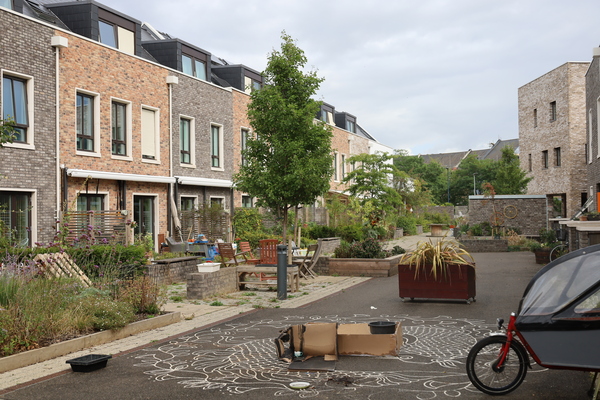Candidate: Marmalade Lane
Location: Cambridge, England
Category: The Great Neighbourhood Award
Year: 2022
Other finalists in this category: Ballynafeigh, Belfast and Govanhill, Glasgow (Winner)
Learning moments
The role of co-housing groups in creating cohesive neighbourhoods
Marmalade Lane is the first council-backed cohousing scheme in the city and the first to have been delivered by a private developer working alongside a cohousing group; it is a great example of co-ownership housing. The driving force behind the project were the members of the cohousing group who invested time, energy and ultimately cash in buying their homes. A project such as this is not for everyone, but the benefits are evident: the ability to self-manage; utilisation of shared facilities and services reducing living costs; the intention to live more sustainably; a reduction in isolation and loneliness. The sense of community was evident even on a cursory visit, prompting us to ask the question “could these commendable structures be applied at a wider community scale?”.
Allocation of land uses and treatment of public realm
At Marmalade Lane, when compared with the wider Orchard Park proposals, there are lessons to be learnt from the impact that car standards have on land-take and how these impede the ability to create social and amenity spaces. The Lane is car-free and the treatment of public realm is unconventional, yet highly effective. The back of one terrace, with its small, open gardens, faces the front of the opposite terrace with the gap between them being only 14m wide; a circumstance that many planning authorities might oppose. The fact is that this has produced an open, human, convivial, safe and active environment.
Flexibility and choice
A strong sense of ownership was created using a high level of customer choice to dwelling customization. The well-conceived architectural solution offered house and apartment types capable of many different internal configurations and purchasers were able to select external finishing and choose kitchen and bathroom finishes, including the option of fitting their own kitchen.
Environmental sustainability
It is notable that the cohousing movement tends to generate schemes whose environmental performance is superior to the norm, with studies suggesting that CO2 emissions from cohousing can be half those of standard housing estates. At Marmalade Lane, houses were built from Trivselhus’ Climate Shield technology and the apartments and common house built using cross-laminated timber (CLT).





